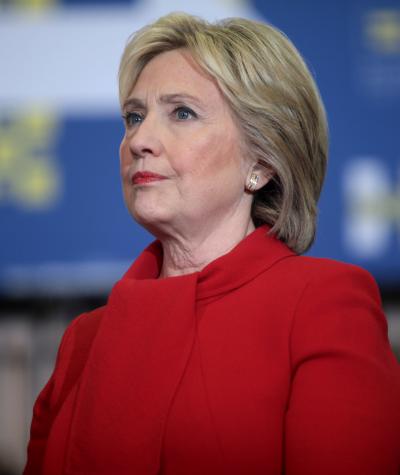CLC filed a lawsuit against the Federal Election Commission (FEC), the agency charged with enforcing campaign finance law, after it let Hillary Clinton’s campaign off the hook for coordinating millions in spending with a super PAC.
The FEC’s dismissal of CLC’s 2016 complaint against Clinton’s campaign and super PAC threatens to give megadonors an even stronger grip on both major parties. And in an illustration of the FEC’s ideological divide, it was the Republican Commissioners – not the Democrats – who voted to drop the investigation into the Clinton super PAC.
In the 2016 elections, the super PAC Correct the Record (CTR), which was notorious for its plans to “push back against” Clinton critics online, declared that it would coordinate its activities with the Clinton campaign. CTR’s founder and chair, David Brock, even declared in an interview that CTR was “basically under the thumb” of the campaign.
Why does this matter? An individual could only contribute $2,700 to Clinton in 2016, but deep-pocketed donors or corporations could give unlimited amounts to an “independent” super PAC like CTR, as long as the super PAC did not coordinate with Clinton. If CTR’s spending is coordinated, the law treats that spending as a contribution, since it is no longer independent and would have substantial value to the Clinton campaign.
Despite CTR spending over $9 million on opposition research, campaign spokesperson training and booking, video production, press outreach and other activities – many of which, by CTR’s own admission, were conducted in coordination with the Clinton campaign – the Clinton campaign never reported receiving in-kind contributions from CTR, and CTR never reported making them..
In October of 2016, CLC filed a complaint with the FEC alleging that CTR had made, and the Clinton campaign had received, millions of dollars in illegal, unreported and excessive in-kind contributions in the form of coordinated expenditures.
Following CLC’s complaint, the FEC’s career staff attorneys concluded that CTR’s $9 million scheme likely violated the law and recommended that the agency pursue the matter. The two Democratic Commissioners agreed but the two Republican Commissioners voted against. Without four votes to proceed, the case was dismissed.
But that isn’t the end of the line. The law gives complainants the right to sue the FEC if the dismissal was contrary to law. That’s certainly the case here.
The Clinton team argued that FEC rules exempting unpaid Internet posts (like blogs) from the definition of "public communications” allowed it to outsource costly opposition research and press operations to CTR without making "coordinated communications."
But the law does not solely regulate coordinated “communications”: It also regulates all coordinated expenditures.
CTR was not a volunteer blogging operation, and most of its activities never took place on the Internet at all. Instead, it was a professional opposition research, surrogate training/booking, rapid response and messaging operation with a $9 million budget.
CTR paying for polling at the request of the Clinton campaign, or making off-the-record pitches to reporters with the campaign’s assent, may not result in coordinated communications, but would result in coordinated expenditures.
As the U.S. Supreme Court observed in a 2001 decision, “coordinated expenditures are as useful to the candidate as cash.” And because CTR effectively operated as an arm of the Clinton campaign, half-million-dollar contributions to the super PAC were largely indistinguishable from contributions directly to the campaign and posed the same risk of corruption.
The FEC’s staff attorneys agreed with CLC that CTR violated the law, writing in their report to the Commission:
"The available information indicates that CTR raised and spent approximately $9 million on a wide array of activities, most of which are not fairly characterized as "communications," in furtherance of its stated mission of working in support of Clinton's candidacy in coordination with [the Clinton campaign]. As such, these payments for CTR's coordinated activities constitute coordinated expenditures and thus contributions to [the Clinton campaign]."
The Clinton team effectively argued that the super PAC could inoculate itself from making millions in illegal coordinated expenditures by posting some piece of the final product on the Internet. The FEC’s lawyers agreed with CLC that this was ridiculous, writing that “CTR and [the Clinton campaign] would have their purported lack of ‘public communications’ swallow the Act's longstanding prohibition on coordinated expenditures:"
Take, for example, the costs CTR incurred for placing poll results on its own website, which CTR argues cannot be deemed coordinated. CTR is correct that the costs for the online placement of the poll results on its own website would not be a cost for a "public communication". . ., but this has no bearing on the conclusion that CTR's payment for the underlying polling, made in coordination with [the Clinton campaign] as it appears all CTR activity was, would be a coordinated expenditure . . . and, thus, an in-kind contribution. The fact that the polling results were subsequently transmitted over the internet does not retroactively render the costs of the polling a "communication" cost.
Despite FEC staff recommending a formal investigation, the Republican Commissioners blocked further action.
The Republican Commissioners have not yet issued a statement of reasons explaining their decision, but the vote appears to be one more example of the increasingly intractable divide on the FEC being between the commissioners who are willing to carry out the mission of the agency, and those who are not.
It isn’t that Republican Commissioners only voting to enforce the law against Democrats, and vice-versa: it is that the Republican Commissioners are ideologically opposed to the mission of the agency, and generally decline to enforce the law at all – thereby helping to further amplify the influence of big donors over our democracy.
The Clinton campaign created a new loophole in campaign finance law, and the FEC's Republican commissioners allowed it to get away with it.
CLC is suing, because if this dismissal stands, then political operatives and wealthy donors from both parties are likely to exploit and widen this loophole in 2020 and beyond.
